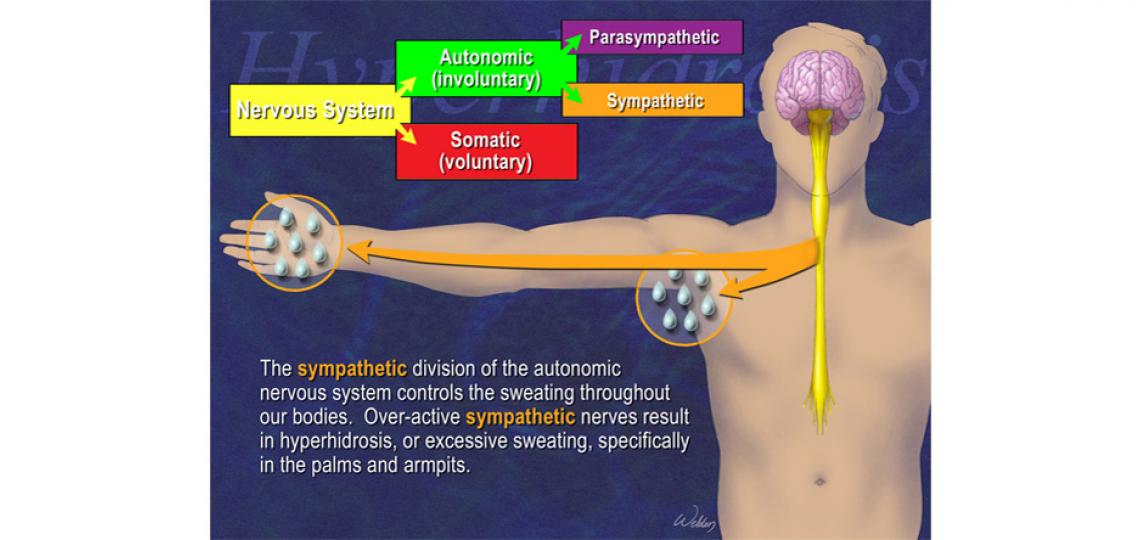Efficient Dermatology Solutions for Excessive Sweating: How to Stop Sweaty Hands and Feet
Efficient Dermatology Solutions for Excessive Sweating: How to Stop Sweaty Hands and Feet
Blog Article
Comprehending the Source of Excessive Sweating and Its Effect On Every Day Life
Extreme sweating, additionally called hyperhidrosis, is a problem that affects a significant section of the populace, yet its underlying reasons and ramifications on daily operating remain rather enigmatic. While it is generally comprehended as a physiological action to manage body temperature, the triggers for extreme sweating can differ commonly amongst individuals, encompassing not only physical aspects yet also emotional and mental components. The impact of this condition extends beyond mere discomfort, commonly affecting social communications and total quality of life. By diving right into the origin of hyperhidrosis and discovering its complex effects, a deeper understanding of this prevalent concern can be obtained, clarifying the intricacies that people coming to grips with extreme sweating navigate each day.
Physiology of Sweat Glands
The policy of sweat production, a crucial physical process, is primarily regulated by the activity of gland dispersed across the body. Sweat glands are classified into 2 primary kinds: eccrine and apocrine glands. Eccrine glands are one of the most countless and are discovered in nearly all locations of the body. They play an important duty in thermoregulation by secreting a watery liquid onto the skin's surface, which vaporizes and helps cool down the body down. In contrast, apocrine glands are focused in areas rich in hair roots, such as the armpits and groin, and their secretions are thicker and milklike in look.
When the body temperature level climbs, either because of physical task, high temperatures, or psychological stress and anxiety, the anxious system triggers the sweat glands to create sweat. This sweat is made up mainly of water and electrolytes like salt and chloride. The procedure of sweat production is vital for maintaining the body's inner temperature level within a narrow, ideal array, highlighting the critical function gland play in human physiology.
Triggers for Excessive Sweating
In recognizing the root causes of extreme sweating, it is critical to identify the triggers that can result in this physical feedback. Too much sweating, also known as hyperhidrosis, can be triggered by different elements, both ecological and physical. One usual trigger is psychological stress or anxiousness, which can boost the body's sweat glands to produce more sweat than is required for cooling. Physical effort, heats, and spicy foods are likewise known to activate extreme sweating in individuals susceptible to this condition. Specific medical conditions like hyperthyroidism, menopause, or diabetic issues can add to extreme sweating as well.
Moreover, medications such as some antidepressants, opioids, and particular supplements can likewise act as triggers for hyperhidrosis. Recognizing these triggers is necessary in managing too much sweating properly - Exessive Sweating. By recognizing and dealing with the specific triggers that trigger excessive sweating in a specific, doctor can establish individualized treatment strategies to reduce this condition and improve the person's quality of life
Medical Conditions Associated
Related to extreme sweating are different medical conditions that can exacerbate this physiological response. One typical problem is hyperhidrosis, a disorder defined by abnormally raised sweating that exceeds the body's thermoregulatory requirements. This can show up in focal areas like the palms, soles, underarms, or face, influencing a person's lifestyle because of social embarrassment and pain.
Furthermore, endocrine problems such as hyperthyroidism, diabetes mellitus, and menopausal warm flashes can likewise lead to excessive sweating. Hyperthyroidism causes an overflow of thyroid hormonal agents, accelerating metabolism and triggering sweating.
Moreover, infections like tuberculosis, endocarditis, and hiv have actually been related to evening sweats, a typical sign known to interfere with sleep and affect total wellness. These medical problems highlight the diverse variety of underlying elements that can add to extreme sweating, necessitating thorough analysis and administration by healthcare specialists.
Emotional and Emotional Elements

Influence On Social Communications
Too much sweating can have extensive results on an check out this site individual's capacity to involve comfortably in social communications. The visible indicators of sweat spots or wet patches on apparel can bring about humiliation and self-consciousness, creating individuals to take out from social situations. This withdrawal can affect relationships, limitation social activities, and prevent personal and specialist development.

In addition, the anxiety and self-confidence problems originating from excessive sweating can affect communication and social abilities. People might struggle to focus on conversations, take part in team tasks, or share themselves with confidence. This can bring about feelings of isolation and loneliness, as social connections end up being challenging to preserve.
Final Thought

While it is typically comprehended as a physiological reaction to regulate body temperature, the triggers for too much sweating can differ commonly among individuals, incorporating not just physical elements but also emotional and mental components. By delving into the origin creates of hyperhidrosis and exploring its multifaceted results, a much deeper understanding of this pervasive issue can be obtained, dropping light on the complexities that people grappling with extreme sweating browse on an everyday basis.
Physical exertion, high temperature levels, and spicy foods are additionally understood to set this hyperlink off extreme sweating in people susceptible to this problem. By determining and dealing with the particular triggers that motivate extreme sweating in an individual, medical care carriers can establish customized therapy plans to alleviate this problem and improve the person's quality of life.
Too much sweating can have profound results on an individual's capacity to engage pleasantly in social interactions.
Report this page